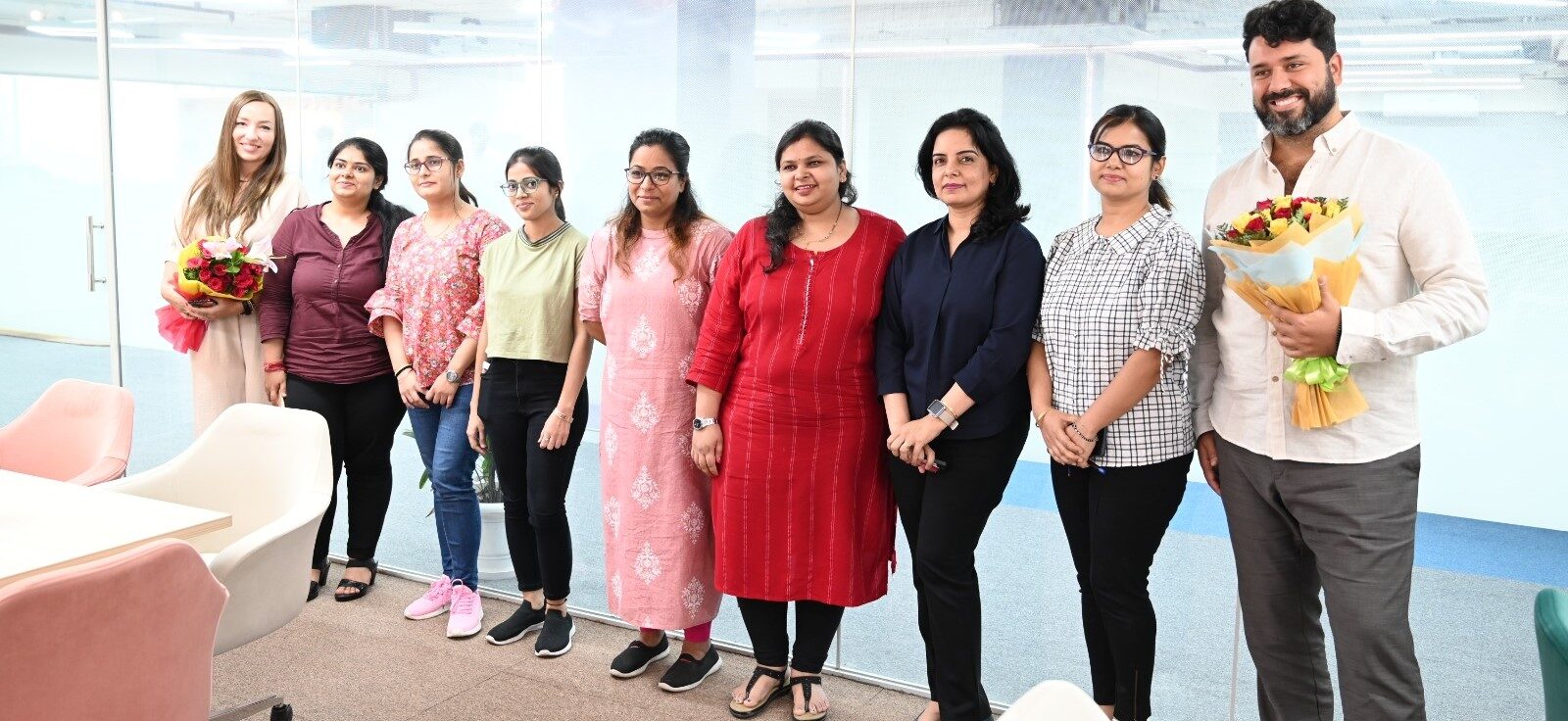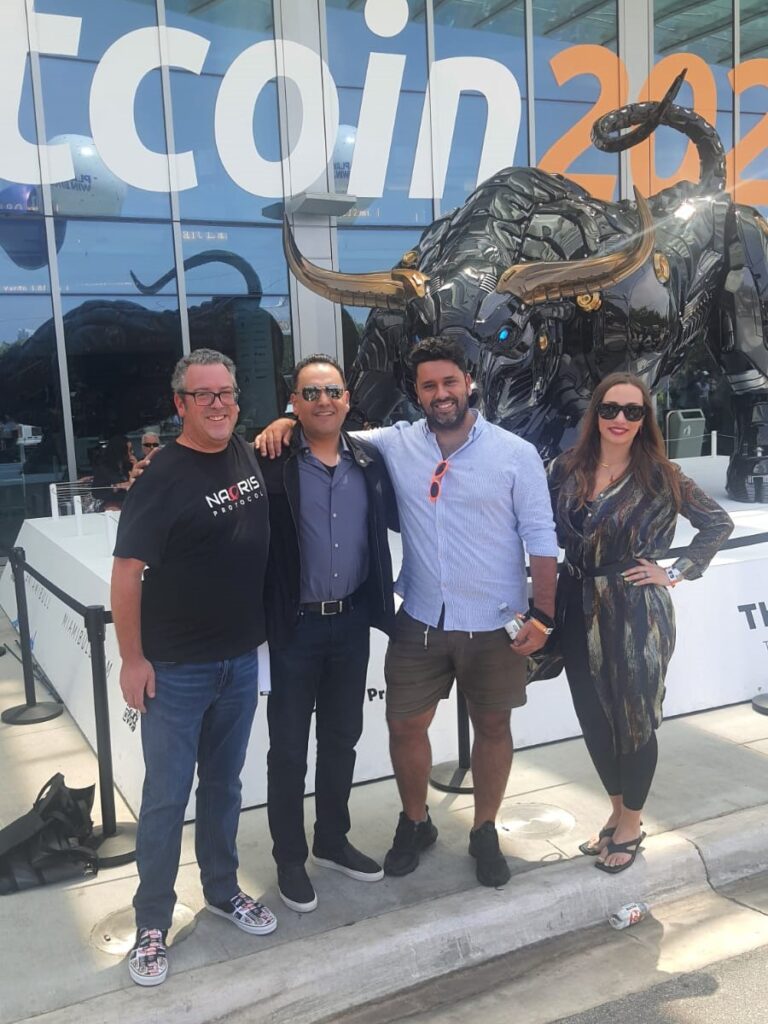Introducing Naoris Protocol
Q: Could you introduce yourself and your startup?
A: Monica Oravcova, and I am the co-founder and COO of Naoris Protocol. We are a cybersecurity company leveraging advanced AI and blockchain technologies to combat the sophisticated threats of today. Our focus is on assisting companies in the industrial sector, banking, and IoT navigate the ever-expanding challenges in the cybersecurity landscape.
Why Start-Up Chile?
Q: What inspired you to become part of Start-Up Chile?
A: Joining Start-Up Chile was a pivotal moment for us, especially since we were in the early stages of launching Naoris Protocol. It offered us an excellent opportunity to solidify our understanding of what it means to be a startup founder—the dos and don’ts. The grant from the Chilean government was incredibly beneficial at that time.
Moreover, the program facilitated valuable connections with companies and government institutions, enabling us to run proof of concepts (POCs) and test our products in real-world scenarios.
One of the highlights of our participation was winning a competition that led to a collaboration with Entel, a major telecommunications company in Chile. This experience was not only a testament to our potential but also an incredible opportunity to validate our solutions.
Additionally, the networking aspect of Start-Up Chile was invaluable. It allowed us to connect with our mentor and engage with other founders, fostering a supportive community around us. The program’s structure and resources were instrumental in accelerating our growth and expanding our network within the cybersecurity and technology ecosystem.
Start-Up Chile Application Process
Q: How was the application process for Start-Up Chile?
A: The application process for Start-Up Chile was relatively straightforward. The program has to sift through numerous startups, so clarity and relevance in the application were key. We needed to concisely describe our business, the problems we’re solving, and how our technology could be applied universally, with a particular emphasis on its potential utility in the Chilean market. There was an openness to supporting startups interested in establishing a presence in Chile, including the possibility of creating a Chilean subsidiary.
However, it’s important to note that our participation coincided with the onset of the COVID-19 pandemic, marking a unique year when the program had to be conducted remotely. This situation presented an additional layer of challenge due to travel restrictions and border closures, making our cohort’s experience distinct from those in typical years. Despite these hurdles, the process remained focused on identifying startups with the potential for a significant impact within Chile and beyond.
Q: What do you think distinguished your company during the Start-Up Chile application process?
A: From the outset, our ambition was to fundamentally transform the cybersecurity landscape. We approached this challenge with big goals and dreams, aiming to make a significant impact on the industry. I believe what set us apart in the application process for Start-Up Chile was our vision of creating substantial change, whether it be through servicing a large customer base, generating considerable revenue, or having a widespread effect on cybersecurity practices. This mindset of aiming for a large-scale impact is crucial for founders.
Addressing a niche problem might make it more challenging for judges to understand or appreciate the value of your solution, especially if it’s highly specialized and they’re not experts in that area. Demonstrating the potential for broad relevance and significant influence in your field can make your startup more compelling to accelerator programs like Start-Up Chile, which is looking for ventures that promise to deliver meaningful and far-reaching benefits.
Inside Start-Up Chile Program
Q: Can you describe the structure of the Start-Up Chile program after acceptance?
A: Upon acceptance into Start-Up Chile, we were assigned an account manager, which was crucial for navigating the program’s requirements. This person guided us through the necessary steps to ensure we could successfully utilize the government grant. It wasn’t a simple case of receiving money directly into our account; there were specific conditions we had to meet. These included mandatory training, meetings, and documentation to prove how we intended to spend the grant wisely—whether on hiring talent, purchasing equipment, or other strategic investments.
Given that this funding is equity-free, there was a strong emphasis on accountability and making sure every dollar was allocated effectively. The process involved a detailed approval procedure with at least two people reviewing our plans. Despite the grant being relatively modest, totaling around $30,000, the administrative aspect was quite time-consuming. Nonetheless, the financial support, coupled with the mentoring sessions we participated in, was invaluable. It allowed us to make significant strides in our development without diluting our equity, providing a solid foundation for our growth and scaling efforts.
Q: How does mentorship work within Start-Up Chile?
A: In Start-Up Chile, mentors are assigned to you based on your startup’s focus and needs. For us, being in the cybersecurity space and utilizing blockchain technology, we were paired with mentors who had expertise in blockchain. Interestingly, one of our mentors was a previous founder who had significantly more experience, which provided us with valuable insights.
The number of meetings and the depth of engagement with these mentors largely depend on the initiative of the participants. While we did have several productive meetings, I found the most value in the broader opportunities the program facilitated, such as connections to competitions, companies, and their extensive network. This access to a wide range of resources and potential collaborators was instrumental in accelerating our growth and expanding our reach within the industry.
Achieving Milestones and Overcoming Challenges
Q: What was a significant milestone your company achieved during the Start-Up Chile program?
A: A pivotal milestone for us during our time in Start-Up Chile was the opportunity to test our platforms on IoT devices. This phase was critical for our development, as it allowed us to validate our cybersecurity solutions in real-world applications. Through the program, we were able to afford the necessary devices for these tests, which might not have been possible otherwise. This testing not only helped us refine our technology but also provided us with invaluable data and insights that propelled our product development forward.
Q: Did you encounter any challenges during the Start-Up Chile program, or is there anything you would change?
A: The most challenging aspect of the Start-Up Chile program was undoubtedly the administrative part—completing all the required documentation and providing the necessary proof. The rigorous process of documenting our spending and activities to comply with the grant conditions was time-consuming and demanded significant attention to detail. This administrative hurdle was the primary difficulty we faced, emphasizing the program’s accountability and transparency requirements. Despite this, the benefits and opportunities provided by the program far outweighed this challenge.
Current Status and Future Goals of Naoris Protocol
Q: What’s the current progress of Naoris Protocol and what milestones are you aiming for next?
A: Currently, Naoris Protocol is at a crucial juncture as we prepare for our Series A funding round. The journey from being a self-funded startup. The journey from being a self-funded startup to this point has been transformative. Participating in Start-Up Chile was a key milestone that helped distinguish us from numerous other startups, acting as an initial validation of our potential and setting the stage for our subsequent achievements.
Following our time in the accelerator, we successfully raised a seed round with the support of prominent Silicon Valley VCs. This funding has been instrumental in advancing our development and expanding our reach.
Looking forward, we are not only preparing for Series A but are also on the cusp of publicly launching our products to the community. This move from testing to a public launch marks a significant transition for us, especially as we introduce a business product alongside our community offerings.
This year is pivotal for Naoris Protocol, with numerous critical milestones ahead. Our goals include not just securing Series A funding but also establishing our products in the market and laying a solid foundation for future growth. These steps are essential for our mission to transform the cybersecurity landscape through our innovative use of AI and blockchain technologies.
Final Advice for Founders Considering Start-Up Chile
Q: What advice would you offer to founders contemplating applying to Start-Up Chile?
A: Start-Up Chile represents an excellent opportunity for both nascent and established startups looking to validate their ideas or expand their operations. For us, it was invaluable at the initial stages for several reasons. Financially, the equity-free grant provided a much-needed boost, enabling us to focus on development without the immediate pressure of investor expectations. The networking opportunities were equally crucial, connecting us with a community of mentors, industry experts, and fellow entrepreneurs who were instrumental in our growth.
For those with a developed product seeking to broaden their customer base, particularly in South America, Start-Up Chile offers a unique platform to achieve this. The program’s extensive network and support can facilitate easier entry into these markets, providing a significant advantage in expanding your company’s reach.
My advice to founders is to see Start-Up Chile as a launching pad that can validate your project, propel your growth, and open doors to new possibilities. The combination of financial support, mentorship, and network expansion makes it a valuable accelerator for startups at various stages of their journey.


